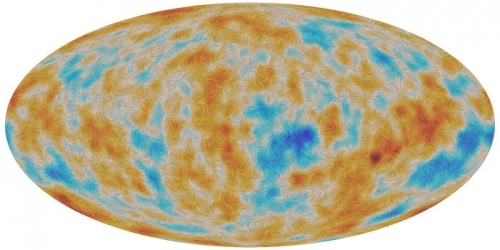Group Directory | Group Calendar | Group Lead | Local Info. (restricted)
The aim of cosmology is to understand the history and structure of the universe. The Big Bang model of cosmology, which posits that the Universe is expanding from an early state which was extremely hot and dense, is well-established. The focus of current research in cosmology is now the initial conditions in the Universe, the nature of Dark Matter and Dark Energy, and the origin and evolution of Large-Scale structures in the Universe.

(Credit: ESA and the Planck Collaboration)
The APC Cosmology group comprises some fifteen researchers and professors who work closely with a similar number of technicians and engineers. They are supported by a dozen post-doctoral students, visitors and PhD students. Several theses are prepared each year in the group, and we regularly welcome trainees of all levels, for a week or for several months, depending on the case.
The group participates in several projects:
- Euclid is an optical and near-infrared satellite of the European Space Agency which is due to be launched in 2022. Its objective is to characterize Dark Energy, to test theories of structural formation in the context of Cold Dark Matter and to confront The theories of gravity modified with new data.
- The Vera C. Rubin Observatory is a telescope project in Chile, intended to carry out, from the 2020s, a survey of the sky of the southern hemisphere (20000 square degrees) in 6 photometric bands (visible). Its scientific objectives are very broad, but as far as APC is concerned, it is also to probe the properties of Dark Energy, the formation of structures and possible modifications to Einstein's theory of gravity.
- Polarbear, the Simons Array, and QUBIC all measure the temperature and the polarization of fluctuations of the cosmic microwave background (CMB). It is a rich source of information on the primordial universe. Polarbear, located in the Atacama desert in Chile, is a CMB polarimeter with high angular resolution. It made the first detection of B-modes from gravitational lensing using CMB data only. QUBIC, also designed to measure the polarization of the CMB, is an instrument based on innovative technology, bolometric interferometry, which combines high sensitivity with precise control of systematic instrumental effects.
- Plans are also being made to contribute to the Japanese LiteBIRD CMB satellite and other long-term CMB projects such as the Simons Observatory and CMB Stage 4
